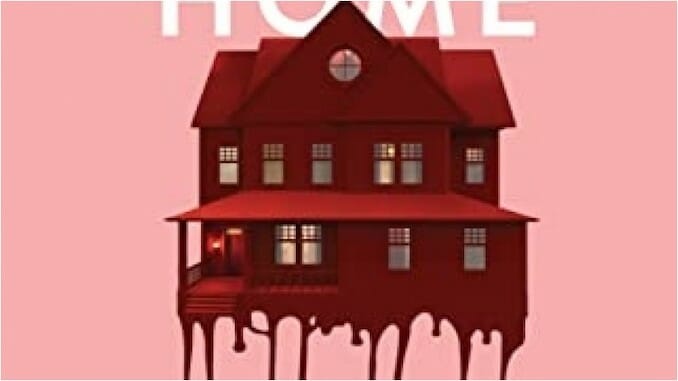Just Like Home: Sarah Gailey Exorcises Our Grisly Obsession with True Crime

At this point, you know when you’re being told a Sarah Gailey story. There will be familial relationships fractured along fault lines, often involving one member shut out of another’s world (Magic for Liars). A house often figures prominently, either a childhood home or one that never got the chance to house a family but has instead been filled with blood and trauma (“Haunted”). And even before the blood, there is the equally impactful trauma of adolescence shaped by an unyielding and unforgiving parent so determined to remake the child in their image that they don’t care if doing so breaks them (The Echo Wife).
Over the past several years, it’s been fascinating to watch Gailey refine the blueprint for a domestic thriller with a supernatural twist, culminating in their latest horror novel that gets beneath your skin before you even realize how deep it’s gone. Examining a serial killer’s legacy through his widowed wife, estranged daughter, and abandoned house, Just Like Home interrogates the bloodlust of the true crime genre alongside a good old-fashioned haunting.
Killings send Vera Crowder away from Crowder House when she’s barely out of adolescence—specifically, her father Francis Crowder’s salacious murders that took place beneath the floorboards where she and her suburban-with-a-sharp-edge mother Daphne slept. Death brings Vera back in adulthood, but it’s Daphne who is wasting away before her eyes; her final request is that Vera pack up the house and take care of things once she’s gone like a good daughter. Never mind that Vera has never considered herself a good daughter, nor a good person.
Crowder House is not the home that Vera left when she was a teenager: In the intervening twelve years, Daphne has cashed in on their unfortunate infamy by opening up the doors to all manner of strangers who feel entitled to witness Francis’ crimes, and to the writers and artists who would scavenge upon whatever creative morsels are left. Crowder House has become part museum and part artists’ residency, so trod upon and carved out as to be almost unrecognizable.
Almost. As Vera settles in for her grim duty as only daughter, she discovers that her childhood fears of something scraping and scratching beneath the bed are alive and well. And now that she knows how awful other people can be, she may be more open to investigating whether there is actually a monster in her room, or whether Vera is filled with the same greasy, choking darkness that’s in her bloodline…and if her superstitious habit of snapping four times won’t succeed in driving that darkness away.
Other writers would stay in their lane between true crime or haunted house story, but Gailey grabs both plots by the throat and binds them together in an unsettling, deliberately related tale. From the first, thorough tour through Crowder House, they establish the repetitive, almost sing-song language of the house that her father built, in all its literal and figurative applications; even though Francis exists only in Vera’s memories, he’s never not present.
Such a claustrophobic setting is extremely effective in making sure the reader never forgets who exactly orbits throughout Crowder House. There’s the awful mundanity of Daphne’s hospital bed taking up the dining room (a detail that will reveal its layered brilliance as the mystery unfolds), and a different sort of haunting in the form of James Duvall, the self-obsessed sculptor who has taken over Francis’ beloved shed as his artistic Airbnb, yet walks through Crowder House as if he owns it. The son of the true crime writer who immortalized a particular version of the Crowder family history, James has wormed his way into Daphne’s final weeks and seeks to do the same with Vera—a greasy parasite who feeds on the lurid facts of the lives lost in that basement.
-

-

-

-

-

-

-

-

-

-

-

-

-

-

-

-

-

-

-

-

-

-

-

-

-

-

-

-

-

-

-

-

-

-

-

-

-

-

-

-








































